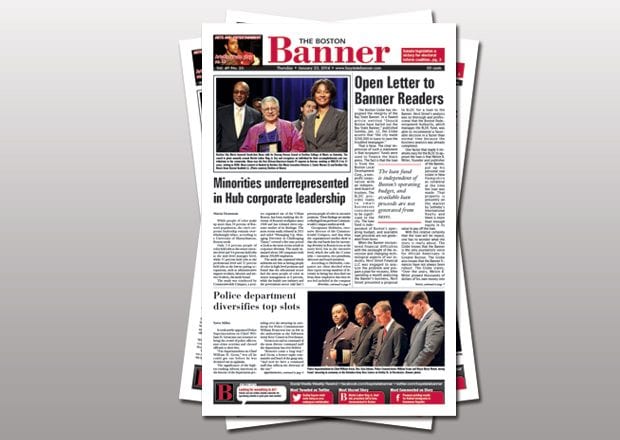
The Boston Globe has impugned the integrity of the Bay State Banner. In a flawed article entitled “Should Boston have bailed out the Bay State Banner,” published Sunday, Jan. 12, the Globe asserts that “the city made $200,000 in loans to save the troubled newspaper.”
That is false. The clear impression of such a statement is that taxpayers’ funds were used to finance the black press. The fact is that the loan is from the Boston Local Development Corp., a nonprofit corporation with an independent board of trustees. The BLDC provides loans to small businesses considered to be significant to the city. The loan fund is independent of Boston’s operating budget, and available loan proceeds are not generated from taxes.
When the Banner encountered financial difficulties with the onslaught of the recession and changing technological aspects of our industry, Next Street Financial LLC was engaged to analyze the problem and prepare a plan for recovery. After spending a month analyzing the Banner’s business, Next Street presented a proposal to BLDC for a loan to the Banner. Next Street’s analysis was so thorough and professional that the Boston Redevelopment Authority, which manages the BLDC fund, was able to recommend a favorable decision in a faster than normal time because the business analysis was already completed.
One factor that made it relatively easy for the BLDC to approve the loan is that Melvin B. Miller, founder and publisher of the Banner, put up his personal real estate in New Hampshire as collateral at the time the loan was made. That property is presently on the market by Sotheby’s International Realty and there is more than enough equity in its value to pay off the loan.
With this relative certainty that the loan will be repaid, one has to wonder what the story is really about. The Globe knows that the Banner is the only journalistic voice for African Americans in Greater Boston. The Globe also knows that the Banner finances have not always been robust. The Globe states, “Over the years, Melvin B. Miller plowed thousands of dollars of his own money into the Bay State Banner to shore up the weekly newspaper.”
Now it seems the Globe intends to be the first to write the Banner’s obituary with the strategy of defaming the publisher to ensure that the Banner’s demise ensues. Relying on the advice of a media business analyst, the Globe predicts that the Banner’s survival is “not sustainable.” The Globe then proceeds to assassinate the reputation of the publisher by asserting that while obligations to BLDC languished, debts of the publisher were repaid. That was not possible. The accounts reveal there was inadequate revenue to do so. The $210,000 Banner liability in question was improperly classified initially as being personal because of the publisher’s guarantee of repayment. Therefore, it was entirely appropriate to transfer it to the corporate account.
The journalistic independence of the Banner is well known. However, the Globe implies that Mayor Menino “threw a lifeline to the Banner” by using his influence with the BLDC “in the midst of a contentious reelection” to gain favor with the Banner. The Globe had the good sense not to suggest the alleged political strategy was effective because there was no evidence to support such false assertions.
Given the troubled financial history of the Globe, one would expect greater sensitivity for the present travails of the press. The former Boston Globe owners, the Taylors, sold the Globe to the New York Times in 1993 for $1.1 billion. Only 20 years later, John Henry bought the Boston Globe and the Worcester Telegram & Gazette for $70 million in cash. Without the bailout of multimillionaire white knights, the mainstream American press would be in financial jeopardy.
But what will be the fate of the black press? For almost 50 years the Bay State Banner has diligently, faithfully and professionally represented the interests of those who would otherwise be overlooked. Why would the Globe publish such a negative and defamatory article despite the valiant efforts of the Banner staff, over a period of several years, to recover from the nation’s worst recession? What is driving the negative attitude since it is highly likely that all Banner creditors will be repaid?
The Globe’s lack of discernment is demonstrated by a telling mistake. No, Boston Globe, Mel King is 85 years old. Melvin Miller is a younger man. I guess in the Globe’s eyes we are all the same after all.
The Boston Globe has damaged its own journalistic reputation with this article.






